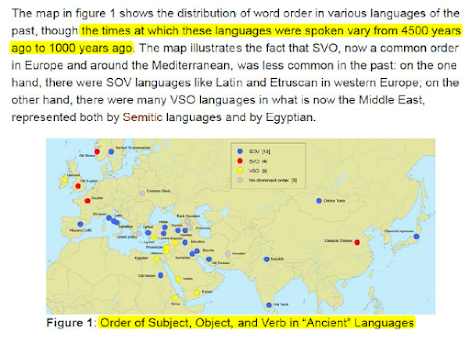Bádirudi ze, garai batean, VSO ordenak ez zirela batere salbuespenezkoak
Genioén herenegun ze Grekera zaharrak ez zuela hitz-ordena nagusirik, eta horren harira ikusi ahal dugu ondorengo mapa non Dryer-ek (an artikulu bat ti atlasa on estruktura sintaktikoak) eskaintzen digún a ordena on zenbait mintzaira zahar, antzinakoak (nahiz ez diren guztiak aldiberekoak, baizik periodo ezberdinetakoak):
Hor, apárte ikusi grekera zaharra kin "no dominant order", deigarria iruditzen zaigú a maiztasuna on VSO ordenak respektu urritasuna on SVOak:
- SOV: 19
- SVO: 4
- VSO: 9
- No dominant order: 6
Jakina, 38 hizkuntza horiek ez dira baizik lagin partzial bat tikan hizkuntzak zein mintzatzen zirén an antzinako garai haiek (adibidez, ez dira agertzen akitaniera edo iberiera), baina halere ez dira batere gutxi VSO ordenak.
Gainera kontuan hartu behar dugu ze, aspalditik ere, VSO ordenak, edo orohar ordena adizlehenak (VSO/VOS), agertzen dirá an familia eta kontinente ezberdinak, hala nola an hizkuntza afro-asiatikoak (zeinen barruan dauden semitikoak), an hizkuntza indoeuroparrak (zeinen barruan dauden zeltikoak), an hizkuntza austronesikoak edo an hizkuntza mesoamerikarrak (zeinen artean dauden hizkuntza maiak).
Gerora, baldintza komunikatiboak gehiago orokortu ahala (esan nahi baita gerota akontextualagoak bihurtzean), VSO ordena horiek joanen zirén bihurtzen erlatiboki gutxio pisuak barnén korronte orokor bat aldén SVO, baina badirudi ze garai batean VSO ordenak ez zirela batere salbuespenezkoak.
Bihar saiatuko gatzaio emáten azalbide bat ki joera diakroniko partzial eta tenporalki-mugatu hori aldé VSO (beti ere kin aukerako SVO topikalizatua), zein, edozein kasutan, ez zén baizik joera progresibo bat aldén VO, eta zein, finean, bukatuko zen nagusiki redirekzionatzen aldén SVO. [1425] [>>>]











